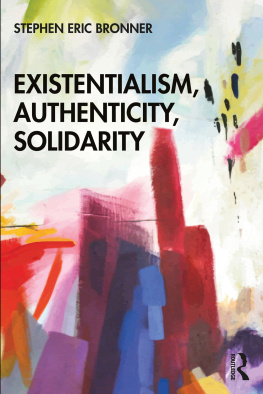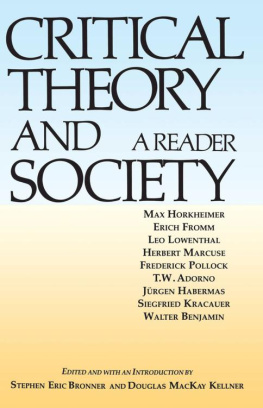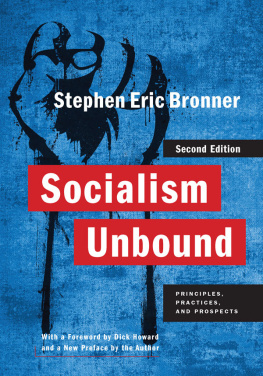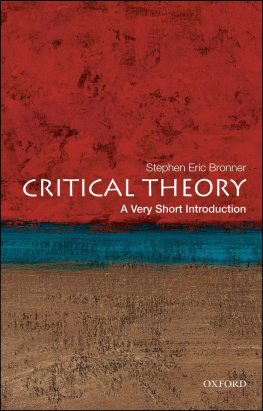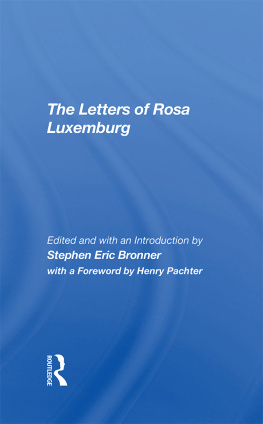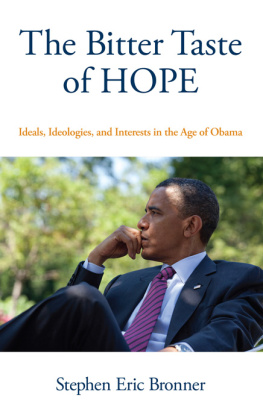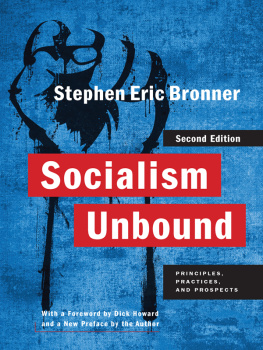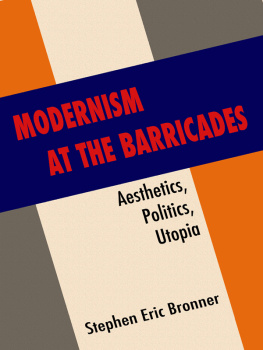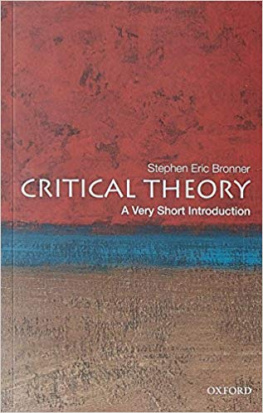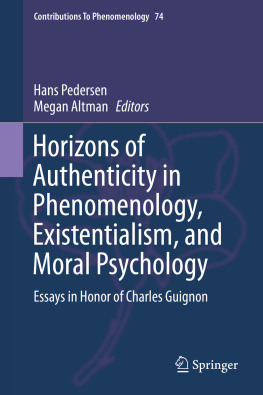Stephen Eric Bronner, known for his work on Marxism and the Frankfurt School, now offers his take on the existentialist alternative. His brilliant critique of the cult of authenticity also offers an innovative ethical alternative. An important contribution to current debates.
Andrew Feenberg , Canada Research Chair in Philosophy of Technology, School of Communication, Simon Fraser University
Stephen Eric Bronners new book is a must read for anyone interested in examining the concept of authenticity. Exploring the existential understanding of the idea, he offers a new and innovative framework of authentic solidarity. It speaks to students, scholars, and activists alike.
Arnold L. Farr , Professor of Philosophy, University of Kentucky, Founder and Former President of the International Herbert Marcuse Society
Before and after the Second World War, existentialism of different kinds was important before fading away. In his well-documented study, Stephen Eric Bronner suggests the current interest of returning to the existentialist theme of authenticity. Well worth reading!
Tom Rockmore , Peking University
Existentialism, Authenticity, Solidarity
What makes individuals what they are? How should they judge their social and political interaction with the world? What makes them authentic or inauthentic? This original and provocative study explores the concept of authenticity and its relevance for radical politics.
Weaving together close readings of three 20th-century thinkers: Martin Heidegger, Karl Jaspers, and Jean-Paul Sartre with the concept of authenticity, Stephen Eric Bronner illuminates the phenomenological foundations for self-awareness that underpin our sense of identity and solidarity. He claims that different expressions of the existential tradition compete with one another in determining how authenticity might be experienced, but all of them ultimately rest on self-referential judgments. The authors own new framework for a political ethic at once serves as a corrective and an alternative.
Wonderfully rich, insightful, and nuanced, Stephen Eric Bronner has produced another bookshelf staple that speaks to crucial issues in politics, philosophy, psychology, and sociology. Existentialism, Authenticity, Solidarity will appeal to scholars, students, and readers from the general public alike.
Stephen Eric Bronner is Board of Governors Distinguished Professor Emeritus of Political Science at Rutgers University. Co-Director of the International Council for Diplomacy and Dialogue and Affiliate Distinguished Scholar at the Center for the Study of Genocide and Human Rights at Rutgers, he has taken part in missions of civic diplomacy in Darfur, Iran, Iraq, Syria, Sudan, and elsewhere. Professor Bronners writings have been translated into more than a dozen languages, and he has been the recipient of many awards, including the 2011 MEPeace Prize from the Middle East Political Network based in Jerusalem.
Existentialism, Authenticity, Solidarity
Stephen Eric Bronner
First published 2021
by Routledge
52 Vanderbilt Avenue, New York, NY 10017
and by Routledge
2 Park Square, Milton Park, Abingdon, Oxon, OX14 4RN
Routledge is an imprint of the Taylor & Francis Group, an informa business
2021 Stephen Eric Bronner
The right of Stephen Eric Bronner to be identified as author of this work has been asserted by him in accordance with sections 77 and 78 of the Copyright, Designs and Patents Act 1988.
All rights reserved. No part of this book may be reprinted or reproduced or utilised in any form or by any electronic, mechanical, or other means, now known or hereafter invented, including photocopying and recording, or in any information storage or retrieval system, without permission in writing from the publishers.
Trademark notice : Product or corporate names may be trademarks or registered trademarks, and are used only for identification and explanation without intent to infringe.
Library of Congress Cataloging-in-Publication Data
A catalog record for this title has been requested
ISBN: 978-0-367-60815-6 (hbk)
ISBN: 978-0-367-60810-1 (pbk)
ISBN: 978-1-003-10624-1 (ebk)
Typeset in Bembo
by Deanta Global Publishing Services, Chennai, India
To those who were there in an earlier time
Contents
Existentialism is a secular phenomenon with religious roots. Straddling two worlds, the feudal and the modern, it speaks to those embracing the profane no less than those worshiping the sacred. That is perhaps among the reasons for its enduring popularity. Like any concept, however, its salience ebbs and flows. Taking modern form in the 1920s, which is understandable given the devastation of the First World War, it exploded on the scene in the aftermath of the Second World War. Many historians and philosophers see these conflicts as part of a single process with the second resolving the unresolved contradictions unleashed by the first. About one hundred million people perished amid the trench warfare of the First World War with its mustard gas and machine guns, and the concentration camps, the Gulag, and the bloodlands that marked the Second World War. This was the extreme situation in which a person exhibited his metal, decisiveness, and authenticity. But it was also the context that seemingly turned the individual into an abstraction: responsibility was to obey orders, death might occur at any moment, anticipating it was a constant burden, andworseeach feared a senseless death in which, paraphrasing Kafka, anyones fate might entail being shot like a dog.
Authenticity was a real issue, and disorientation was a dominant cultural theme. Ernst Bloch put it this way: He cant go on. He doesnt know why or how. And so, more subservient, he allows himself to be used even more than before-believing himself something other than he is. Perhaps that blend of feelings occurs every time there is genuine social conflict. With the Nuremburg Trials, and the beginning of the Cold War, it spoke to the individuals willingness to take a stand, assume responsibility for his or her conduct, and understand precisely what totalitarianism denied: freedom. It was the fight for freedom, not just for the Self but for the Other, which defined who one was. Young people in the 1960s were still affected by the growth of fascism and its exercise of power; many were intoxicated by the drama of unspeakably terrible events and the rise of a new man whose license was unlimited. Its probably fair to say that the concept of authenticity provided a bridge between generational conflicts. Young people in Germany were not taught about Nazism, those in France were fed the myth of the Resistance in which everyone participated and no one was a collaborator, and it was the same in Italy. Young people wanted to know what daddy was doing during the war and what responsibility they shouldered for dealing with a genocidal legacy.
Emerging from the stifling conformism of the 1950s and early 1960s, the inherited racism, and the Manichean ideology of a cold war that often grew scorching hot, resistance to the system required an ethical foundation. Northern liberals in the US were appalled not merely by Southern segregation but also by the existence of 10 million poor people living in what Michael Harrington called the other America. Our society was not what various authority figures told us it was, and a second civil war seemed in progress between the Civil Rights movement and a segregationist Dixie. Non-violent or violent? Racial or cosmopolitan? Reformist or revolutionary? Sartre told us later it is right and rational to revoltbut what was the basis for our resistance and how would we express it? For people of color, the choice seemed to pit Martin Luther King Jr. against Malcolm X. The colonized found their revolutionary heroes quickly enough. Old timers over 30 had their traditional left-wing ideologies. But for young people, who took resistance as something more than a fad, it was another matter entirely. It was directed against a culture industry, which sought the lowest common denominator, and longstanding prejudices that led to the assassination of the Kennedys and Martin Luther King, and the genocidal imperialist war waged by the United States in Vietnam.


